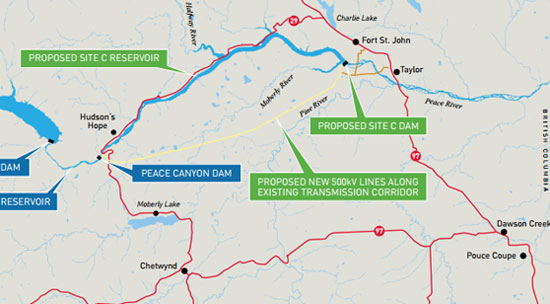The Council of Canadians has been opposing the Site C dam since March.
Site C is a proposed 60-metre high, 1,050-metre-long earth-filled dam and hydroelectric generation station that would be located on the Peace River between the communities of Hudson’s Hope and Taylor in northeastern British Columbia. It would create an 83-kilometre-long reservoir and flood about 5,550 hectares of agricultural land southwest of Fort St. John. It would submerge 78 First Nations heritage sites, including burial grounds and places of cultural and spiritual significance.
A spokesperson for BC Hydro admits the power from the dam is necessary given expectations for major growth in the liquefied natural gas, mining and forestry sectors in the province as well as population growth. Much of the power will go to environmentally destructive projects like fracking in British Columbia, which in turn is used to fuel the extraction of bitumen from the tar sands. It has been estimated that Site C would emit 150,000 tonnes of greenhouse gas emissions a year, the equivalent of adding 27,000 cars on the road.
After the British Columbia government approved the controversial dam in December 2014, Council of Canadians chairperson Maude Barlow stated, “We are deeply disappointed by the B.C. government’s short-sighted decision. We stand in solidarity with Treaty 8 First Nations whose treaty rights will be violated with this project. But this affects everyone in the region — farmers, residents, and scientists alike.”
Earlier last week, the Blueberry River First Nations, a Treaty 8 First Nation, launched a legal challenge against Site C to be heard in the B.C. Supreme Court. CBC reports, “The area the band claims as its traditional territory is located in northeastern B.C. and includes the city of Fort St. John and the location of the proposed Site C dam. …[Chief Marvin Yahey of the Blueberry River First Nations wants] the Site C dam and other projects slowed to provide time for consultation, which he called ‘disappointing’ to date.”
The Peace Valley Landowner Association (PVLA) is also challenging Site C in court. They contend that, “The only independent review of the Project to date, by the federal/provincial Joint Review Panel, concluded that fundamental questions of cost, need and alternatives to the Project are not settled, and require further independent and public review by the BC Utilities Commission, before the Project is built.”
Their media release notes, “The PVLA case will be heard by the BC Supreme Court starting April 20, 2015, and by the Federal Court of Canada during the week of July 20, 2015. First Nations’ legal challenges to the approvals will be heard consecutively with the PVLA cases. All cases will be heard in Vancouver.”
Construction of Site C could begin this summer with a completion date of 2024.



